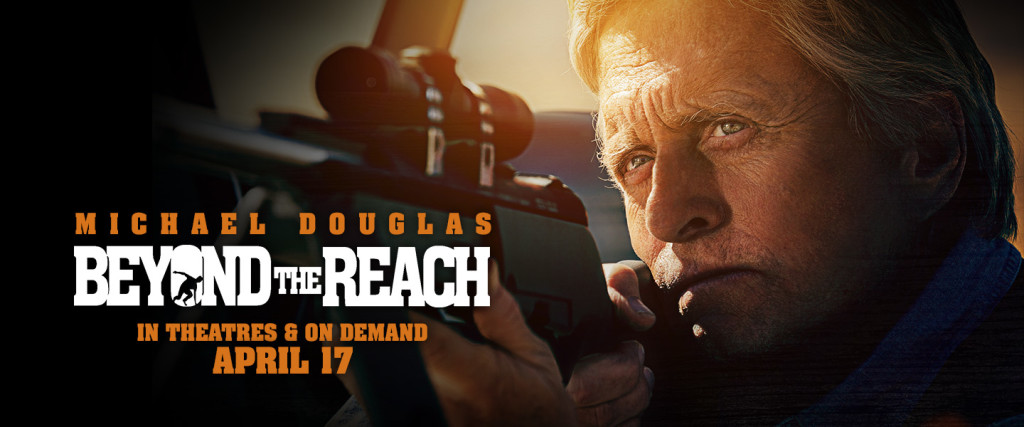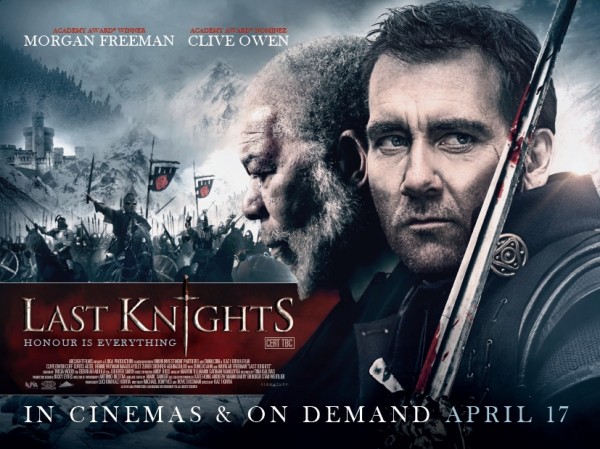Beyond the Reach stars Michael Douglas (in a role perfectly suited for Gordon Gecko) as a business man who, on the side, like to hunt rare and wild animals. John Madec really wants to place the elusive bighorn on his wall, and so he hires the local hunting tour guides (as well as bribing the local sheriffs) to obtain his permits and get his possession. Ben, our tour guide, cares little for much except for his girlfriend, who will go to college in a few days. But, Madec’s offering a lot of cash, and who says no to cash in the middle of nowhere?
In typical film fashion (or, in this case, adapted book fashion), things go sour relatively quickly. Madec’s no hunter, even with his cadre of professional equipment, and when he takes an opportunity to shoot with the sun in his eyes, Ben becomes witness to an unintentional killing. So, what do you do, Ben? Do you help the millionaire cover his tracks, taking his offer for a job and a life greater than your wildest dreams? Or do you pursue straightforward notions of justice, seeking to bring Madec down to your local police precinct?
If the length of the movie gives you indication, their relationship quickly descends into a cat-and-mouse game through the Mojave Desert where, due to the possibility of bulletholes traced to Madec, he needs Ben to die in the desert simply from the heat. That strange thriller setup forms the basis of Beyond the Reach’s content, and boy is it engaging! Honestly, I’m not sure how you maintain interest in such an idea with such slow pacing; the film takes its sweet time setting up all the dominoes before striking them down, so the “action” really consists of a constant game of wits. There’s even a decent amount of foreshadowing throughout, and none of the film’s frames seem lightly filmed. I noted that, in the trailer shot at the beginning, you could see Ben’s failed SAT scores. The film’s very good at show without tell, and that’s a excellent quality in a visual medium.
Now, will Beyond the Reach surprise you in any respect? Absolutely not! Do you doubt who will win, and who will lose? Does a Michael Douglas character of that level of cartoonish villainy going to do something stupid? Yes, of course! But is Michael Douglas a pleasure to watch, relishing such a fun role? Necessarily! Beyond the Reach functions best as a work of craft and excitement, rather than having anything in-depth or meaningful to say. I enjoyed it far more than the premise would indicate, but your mileage could vary. depending on your expectations. My brother expected The Most Dangerous Game, and ended up with something far more pragmatic by comparison. Still, I can’t say you won’t enjoy it; it’s only 90 minutes long, after all!
Last Knights, however, will prove a far harder sell for the majority of people. At its very basic, Last Knights retells the story of the Fourty-seven Ronin in the context of an ambiguously medieval, yet also strangely multicultural, world. Morgan Freeman represents the master of a band of samurai (*AHEM*, knights, I mean); he sees injustice under the rule of the Emperor (seriously, they didn’t even bother to disguise this stuff), and refuses to give bribes to the Emperor’s corrupt minister Geza Mot. Unsurprisingly, the noble heart of Bartok lands him in a heap of trouble, which forces Raiden (Clive Owen, playing Clive Owen Medieval Style) to kill his own master. Disgraced, and with the Bartok lands distributed among the remaining nobles due to Morgan Freeman’s death, the Knights of Bartok go their separate ways. OR DO THEY?
The case of Last Knights presents an interesting conundrum, to say the least. In Japan, the Fourty-seven Ronin (to distinguish it from the English-language film of the same name, which also tells this same story) remains a ubiquitous example of loyalty. It exemplifies the (somewhat invented) code of bushidō, a fusion of Buddhist virtues with the often violent lives of the warrior class. In effect, it became the “national legend” for Japan, and remains as such to this day. One cannot let outside forces besmirch their honor, right? If you thinking about it as an outsider, this sounds completely insane and strange; however, to understand that story’s influence in Japanese culture tells you a great deal about their pop culture as well. For better or worse, that story continues to be retold for generations, in the same way we often re-tell the story of America’s birth (without hinting at shades of gray).
So, how do you adapt this story to a completely different cultural context without, in some way, betraying its heritage as a film of samurai tropes? Well, I guess you don’t! Last Knights assumes a general level of unfamiliarity with the basic story notes, which seems like a relatively poor choice; considering that Japanese film ideas seem almost mainstream at this point, you would imagine they would adapt these things just a little bit to throw you off guard. And, in a sense, they do, with a plot twist that lengthens the film considerably with (wow) character development. But, you sorta know where these themes and ideas will go, and in the end that diminishes Last Knights somewhat.
That said, the action and stunt choreography looks great and clear due to Kazuaki Kiriya, a Japanese director known for the live-action Casshern and Goemon. Thankfully, it uses little CGI, and instead involves actual sword-fighting by the actual cast! As well, I can’t really say any of the actors did a bad job; they all worked with the material on hand with the appropriate gravtias, lending well-worn material some more spitspine than it probably deserved. That said, your tolerance for its predictability comes down to an intrigue around the concepts contained therein; outside of a peek into the window of a different set of cultural values, you probably won’t find much to like. Or, you could just watch one of the many Japanese films which revolve around the story!


